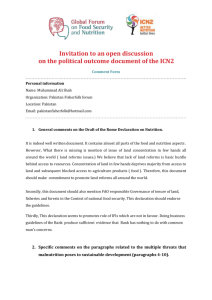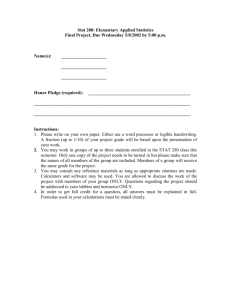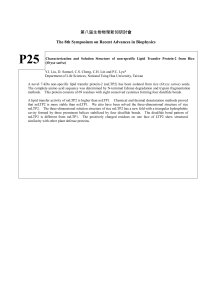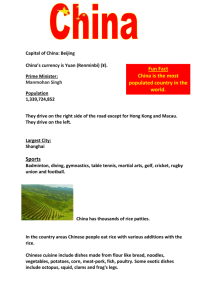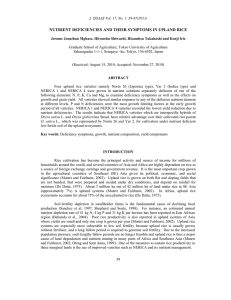The nexus of Healthy Food, Healthy Environments and Healthy People
advertisement
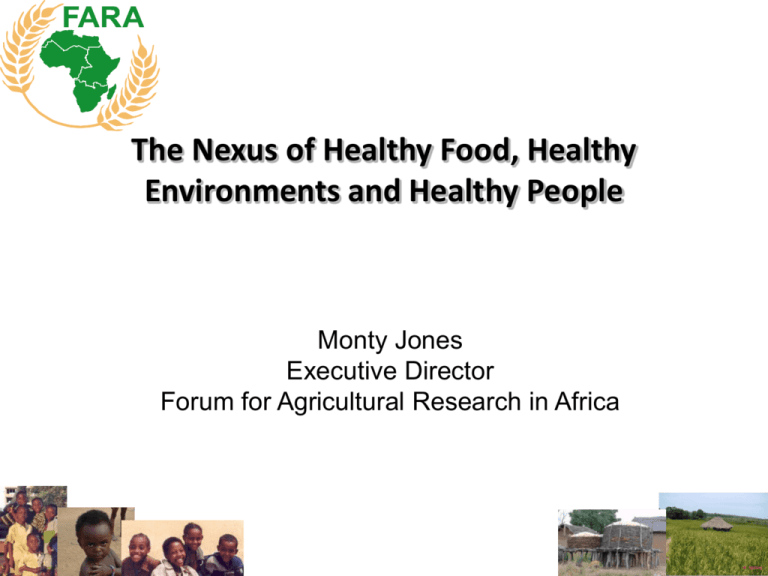
The Nexus of Healthy Food, Healthy Environments and Healthy People Monty Jones Executive Director Forum for Agricultural Research in Africa 1 Food Security all people, at all times, have; - physical, - social and - economic access to sufficient, safe and nutritious food which meets their dietary needs and food preferences for an active and healthy life The nutrition concepts adds caring practices i.e.; - health services healthy environments termed Nutrition Security Maxwell and Frankenberger 1992 Herwig Hahn 2001 Nutrition Security Is achieved if every individual has - physical - economic - environmental access To balanced diet that includes - the necessary macro and micro nutrients - safe drinking water - sanitation - environmental hygiene - primary health care - education so as to lead a healthy and productive life Herwig Hahn 2001 Africa’s food, nutrition and health Agriculture • accounts for 60% of labour • 20% of total merchandise and 17% of GDP In 2000 Africa • Received 2.8 million tons of food aid In 2001 • 28 million Africans required emergency food aid • World Food Programme has spent 45% of its total budget or US$ 12.5 billion on food emergencies in Africa Malnutrition in Africa the most prevalent and pernicious disease • Absolute number of chronically hungry rose from 173 to 200 million people (%) Children (106) Children 60 200 180 50 • Of 53 countries … – 30 have 20% under nourished – 18 have 35% chronically hungry • 1/3 of children <5 in developing countries are stunted due to inadequate feeding and poor health 140 40 120 30 Asia 100 80 20 60 Latin America 40 10 20 0 0 Although absolute numbers are decreasing, the numbers in Africa are increasing Africa 160 1980 1990 Year 2000 1980 1990 2000 Year Estimated Rates (%) and Numbers (106) of Stunted Pre-school Children from 1980 – 2005 (Food and Nutrition Seminar, May 2001) Ulrike Rötten 2001 Nutritional Deficiencies • Micro nutrients (vitamins & minerals) • Calories and proteins Can cause • Disease and death • Impact negatively on intellect and • • education with long term effect on society Undermines capacity for work, causes loss of productivity through sickness Reduces total lifetime working years Common deficiencies Effect Poor nourishment Weak immune system Prone to infections, parasites diarrhoea Vitamin A Infections Skin & eye diseases Growth retardation blindness Iodine Retarded mental development cretinism Iron Anemia Reduced physical activity Herwig Hahn 2001, Foster 1992 Effect of malnutrition to the economy • Studies shows malnutrition… – Predisposing cause for 50% of diseases – Reduces economic growth by 1% • Under nutrition reduces productivity through – Lost physical and mental capacity – High morbidity • Poor households and individuals are – Unable to achieve food security – Unable to utilize or contribute to the creation of resources for sustaining healthy life Herwig Hahn 2001, Foster 1992 Research on the New Rice for Africa (NERICA): a case study in nurturing hope Agricultural research for development multiple objectives Make food … • more available – more rice • more affordable –> cheaper rice • more nutritious –> better quality rice • more dependable –> less risk from drought, diseases & pests • more varied –> more cash to buy choice foods • more safely produced –> less use of herbicides & pesticides more available – more rice Sativa characteristics of NERICA • strong upright growth to support heavy seed heads safely to harvest • secondary branches giving over 400 grains per panicle compared with about 250 for glaberimas • non-shattering grains • respond to mineral fertilization Resulting to … More yield per unit input, land, labour, capital - without fertilizer NERICAs produce 25 –100% yield increases over sativa - with fertilizer NERICA doubles yield of glaberrimas more dependable –> less risk from drought, diseases & pests more safely produced –> less use of herbicides & pesticides Glaberrima characteristics of NERICAs • Improved weed and pest control – Rapidly cover the ground with profuse tillering and leaf growth that shades out weeds – early maturity at 90–100 days, compared with upland sativas at 120–140 days in West Africa – resistant to African rice gall midge, the region’s most devastating insect pest – resistant to rice yellow mottle virus, a major disease in lowland rice – resistance to blast (pyriculose) disease • Improved drought tolerance more nutritious –> better quality rice Added characteristics of NERICAs • over 70 % of the NERICAs have higher protein content than either parent ~ 10.5% more compared with 8% typical of sativa parent • taste, aroma and other grain qualities favoured by African producers more varied –> more cash to buy choice foods NERICA’s direct impact to nutrition More varied food Higher yields increase profits of producers Results - additional income - increase purchasing power of farmers to buy greater variety of foods Research impact on food security and nutrition NERICA is just one example • Improved nutritional quality of foods – Golden Rice – Quality Protein Maize – High beta carotene sweet potatoes • Livestock production – Provide high quality readily available protein – Range of essential micronutrients which improve health, body size and cognitive capacity Research impact on food security and nutrition Ongoing research in Africa • Other crops resulted to - improved cassava, TC-banana, IR-Maize etc. • Other areas livestock, fisheries and trees Focus on • Reduce post harvest losses and storage • Improve food processing, shelf life and food quality • Improve markets - reduce the cost of marketing - improve access to markets for smallholders • Improve the safety of food - reducing aflotoxin infections and improve food handling Summary Food is the single most important influence on human health Without agricultural research, rural households in poor countries would be condemned to • Hunger • Stunted physical growth • Impaired cognitive capacities • Short life expectancy • Perpetual under development In short … the lack of sufficient food of the right quality of food will keep poor people poor Summary Impairment of livelihoods in developing countries … - is intolerable on humanitarian grounds - shuts off markets for US goods - damages the global environment …leads to despair and hopelessness with grave Global Security Repercussions 15
